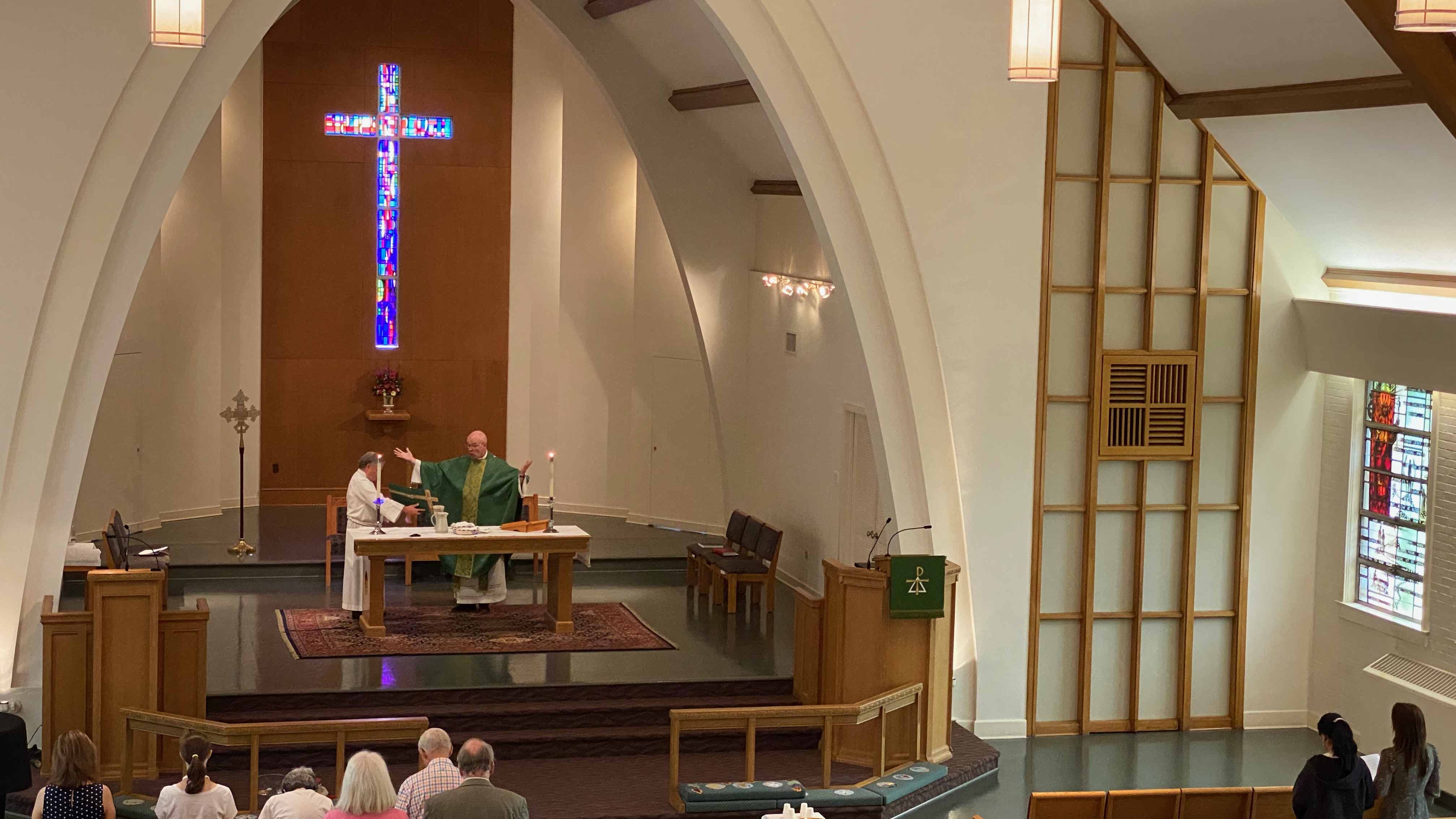Week of Easter Seven
Join Us for the Bible in Christian Worship this Wednesday:
Our explorations of the biblical foundations for Christian worship conclude this Wednesday, June 1 with Gail Ramshaw finishing up her presentations on the lectionary, thus deepening our understanding of the place of the appointed readings in our Sunday worship. Please look in your Constant Contact messages for a Zoom link, that your participation may enrich your worship life for the work in and for the world that God has entrusted to us. If you do not receive our Constant Contact messages, then please This email address is being protected from spambots. You need JavaScript enabled to view it..
Please note that beginning on June 6, we’ll shift back to our Monday evening Bible Study format with sessions beginning at 6:30. In the coming weeks, we’ll take a look at the lectionary readings for the upcoming Sundays, viewing the readings in relation to each other to see what new horizons of meaning emerge.
“At Pentecost, Thoughts on the Discernment of Spirits”
Dear Friends in Christ:
Since we are on the cusp of celebrating the Day of Pentecost, when the Holy Spirit descended upon Jesus’ followers as recorded in Acts 2, and since we have been living and serving for two millennia in what we might consider the epoch of the Holy Spirit, the third person of the Trinity, we do well to consider what we mean by the Holy Spirit.
First off, it’s important to recognize that there are all manner of spirits, and not all of them holy. The Apostle Paul acknowledged as much when he wrote about powers and principalities of the world (cf. Ephesians 6:12). We aren’t talking about ghosts and goblins here. Rather, we might have in mind communal energies that transcend particular individuals, as in “team spirit.” Scholars write about zeitgeist, or the spirit of the times. Or some colloquially talk about the “vibe” in the room. The word “ethos” also comes to mind, as in the characteristic spirit of a culture, era, or community. In these ways, spirit, and perhaps even spirituality, inhabit the realm of quite common and ordinary human experience.
The generic reality of spiritualities invites us then to discern and identify the qualities of the Holy Spirit of the Trinitarian Godhead in the specifically Christian tradition manifest in the church and world. We are not left without help for these considerations. The witness of the Christian scriptures gives us criteria for understanding the dimension of the fruit of the Holy Spirit. These same scriptures also give us lists of qualities which are not of the Holy Spirit of the God made manifest in Jesus Christ. Paul, for example, writes in Galatians that the fruit of the Holy Spirit is marked by the following qualities: “love, joy, peace, patience, kindness, generosity, faithfulness, gentleness, and self-control” (Galatians 5:22). In contrast, Paul lists in that same passage qualities which he believes are opposed to the Holy Spirit, namely: “fornication, impurity, licentiousness, idolatry, sorcery, enmities, strife, jealousy, anger, quarrels, dissensions, factions, envy, drunkenness, carousing, and things like these” (Galatians 5:19-21a).
With such criteria in mind and at hand – and there are other such listings of qualities of the Holy Spirit elsewhere in the New Testament – we are called to engage in the discernment of the spirits of our age, in the church and elsewhere in the world. Etymologically speaking, the Greek word that translates discernment implies a kind of discrimination, making judgments about what is of the Holy Spirit and not. This is not discrimination in terms of injustices against people, rather the identification of what is and isn’t of the Holy Spirit, as in discriminating tastes.
So, with such listings as Paul’s in Galatians, we are given quite clear criteria with which to judge the spirits of our age, again, in the churches and in the world. When it comes to the spirit or ethos or vibe given off by some churches and pastors and preachers today, I think it is abundantly clear that some churches are not living according to the dimensions of the fruit of the Spirit identified by Paul. Many churches today, including Lutheran, but certainly others, embody and express a communal spirit that is more suggestive of idolatry, enmities, strife, jealousy, anger, quarrels, dissensions, and factions than Holy Spirit qualities of “love, joy, peace, patience, kindness, generosity, faithfulness, gentleness, and self-control.” When Christian leaders lead by cultivating and stoking people’s anger, fear and grievance, that is simply not of the Holy Spirit. It’s that clear and straightforward. There is no ambiguity. I believe that we are called upon in our day to be more courageous in proclaiming that some churches and Christian leaders are simply not living and teaching and proclaiming according to the dimensions of the fruit of the Holy Spirit as identified in our scriptures.
Then consider the zeitgeist of our wider culture and society. Much of what we endure in the news and on social media and more is held captive by the powers and principalities, the qualities that are opposed to the Holy Spirit, as Paul identifies. “Impurity, licentiousness, idolatry, sorcery, enmities, strife, jealousy, anger, quarrels, dissensions, factions, envy” – do these qualities not prevail in our current popular social and cultural climate? Do we – even secular persons who are not Christian – not long in our hearts for the humane qualities of the Spirit, such as “love, joy, peace, patience, kindness, generosity, faithfulness, gentleness, and self-control”? While these are features of the Christian ethos according to Paul, this listing is also in keeping with secular philosophies which may point to more universal human aspirations.
A lot of what troubles us in current popular culture and society boils down to an ethos that pursues and fetishizes the ways of death in contrast to a culture that promotes life abundant and holistically understood. And I am not reducing this consideration to the pro-life vs. pro-choice controversies surrounding abortion. It’s a far broader and more comprehensive orientation. We as a society seem to be captive to ways that make for death, and actively resist that which makes for life understood as comprehensive, holistic well-being for all.
The Day of Pentecost in the church’s calendar falls on the fiftieth day of Easter. Thus, there is an intimate connection in the Christian tradition between the Holy Spirit’s coming and the death and resurrection of Jesus Christ. That is to say, the Holy Spirit’s advent occurs in the context and because of Christ’s death and resurrection. Christian spirituality, thus, cannot be separated from Jesus Christ and what God, the Father, accomplished in and through Christ. What were the proclamatory utterances of Peter and the others at Pentecost, when empowered by the Spirit, but the preaching in the languages of the nations of God’s deeds of power in raising Christ from the dead (cf. Acts 2:11; 22-24; 32)?
To conclude this reflection, then, may the Holy Spirit embolden us to nurture in word and deed a culture of resurrected new life in Christ as a countervailing witness to the ways of death that prevail in so much of society and in too many churches. May the Spirit of God in Christ nurture in us the dimensions of the fruit of the Spirit for the healing of the nations.
God in Christ help us through the encouraging and emboldening guidance of the Holy Spirit,
Pastor Jonathan Linman






